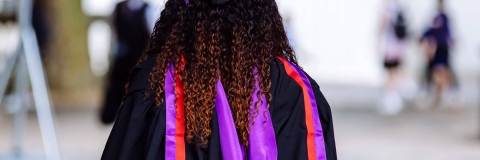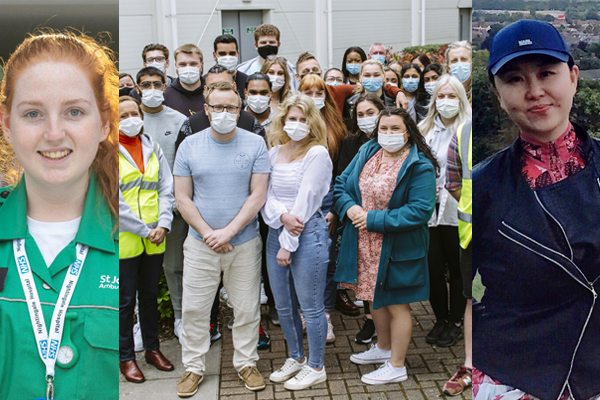
VC's Introduction
This is my last bulletin of this academic year. And what a year it has been. While for all of us it has been at times challenging and stressful, it is important not to forget that despite the pandemic we have also achieved a great deal. Colleagues across the University have worked tirelessly to support and educate our students, deliver impactful and world class research, and play a role in our city and communities. You should be rightly proud of what you have accomplished.
While reflecting on what’s been good I’m pleased to be able to announce in this bulletin the winners for the Vice-Chancellor’s Awards for Excellence. Congratulations to all those winners and everyone who has been commended for their activities.
This month we are also hosting Graduation for our 2020 and 2021 graduates. Not being able to host Graduation last year was disappointing but the only sensible decision we could take. This year it feels as though the ceremonies will have an extra special meaning after all that our students, and we, have been through. There is more about the ceremonies in this bulletin.
I also share an update on our plans for a Medical School and our new partnership with Highbury College which is soon to merge with Portsmouth College to become the new City of Portsmouth College. Both clear signs of how we are continuing with our strategic plans and moving towards our goal of being a top modern university.
With the close of one academic year, thoughts inevitably turn to the next. I was pleased that the Government stated in their recent announcements that there will be no restrictions on in person teaching and learning activities for universities. This is so important and will enable us to deliver the experience that our students want and deserve. We are still working through some of the details as we await detailed guidance in relation to any Covid measures that will still be in place when teaching resumes in the autumn.
Although Graduation usually marks the end of the year and an opportunity to take a break, this summer will continue to be busy for many. I know many colleagues across the University will be working intensively throughout confirmation and clearing. It has been a difficult year for recruitment and I’m grateful for everyone’s efforts with this vital activity.
My bulletin will return in the autumn. I hope that over the summer you will have the opportunity to take a break and recharge your batteries. Thank you for all that you have done.
Vice-Chancellor’s Awards for Excellence
It’s my great pleasure to today announce the winners in the Vice-Chancellor’s Awards for Excellence.
It’s been an extraordinary year, and many of the 8 award winners and 16 commendation winners reflect the extraordinary efforts made by our students and staff to support our University, community and the nation during a global pandemic. So many went the extra mile during a tough year. I’m very proud and so glad we can celebrate their exceptional contributions in this way. They deserve every recognition.
While we announce the winners now, we will celebrate their achievements at an awards event on campus on 15 September, which will also be live streamed so that a wider group of friends, family, students and colleagues can watch and celebrate their peers. Further details of the event will be shared nearer the time.
I’d also like to thank all of you who took the time and effort to nominate people, and to the VC Awards Panel who spent hours assessing the high number of nominations.
I hope you feel equally proud of our award and commendation winners, and please send them your congratulations and warm messages as I’m sure they will appreciate it.



Graduation
Graduation is a big event in any year, but the number of in-person ceremonies which have started this week is on a scale we’ve never seen before as we celebrate the achievements of two cohorts of students.
44 ceremonies over three consecutive weeks will take place at Portsmouth Guildhall for the Class of 2020 and 2021 – with strict safety measures in place. We have worked closely with Public Health Portsmouth and other civic partners to ensure the events will be safe, including asking for proof of Covid-19 status through testing or vaccinations, halving normal capacities to ensure social distancing, as well as temperature scanners, extra time between ceremonies for cleaning and disinfecting (virus fogging) of the building, and face masks for ceremonies taking place ahead of the Government’s lifting of Covid restrictions.
When making a decision on Graduation the test I have always applied is this: if we can conduct COVID-safe graduation ceremonies - and Public Health Portsmouth tell us we can - we have an obligation to our students, their families and the City’s Visitor Economy to do everything in our powers to make these ceremonies happen.
While some students chose virtual graduations, the large majority opted for in-person ceremonies which reflects how special and important an occasion it is for them to mark their achievements.
Many colleagues have helped organise these events, but I’d particularly like to thank colleagues in DSAA who have worked tirelessly to bring everything together to ensure a large number of complex events take place as smoothly as possible. I’ve no doubt that our efforts will be appreciated by students, their families and friends.
Implementing our University Strategy
The University Executive Board met face to face on 5 July for an awayday focused on the implementation of our Strategy 2025. It was great to be able to meet in person and to turn our attention away from the immediate to our longer term aspirations.
It was clear from the discussions that success in achieving our objectives will require our whole University community to act together in taking collective responsibility for the delivery of our strategy - it should inform the way we approach everything that we do. This means each one of us challenging and supporting each other to be ambitious, responsible and open to change, with an emphasis on teamwork and collaboration with colleagues and partners both locally and internationally.
Crucially we will place educational excellence at the heart of everything we do, prioritising our effort where we create the greatest impact. With this prioritisation in mind, UEB’s collective intent is to tackle the following key strategic imperatives over the next two academic years:
- Reverse the ongoing decline in applications and boost conversions
- Pursue educational excellence, improve student experience and reduce variation in outcomes
- Rapidly improve graduate employment
- Increase our globally recognised research and innovation based on thematic areas, prioritising collaboration and international engagement
These are the same priorities we set for the resourcing planning cycle for 2021/22. It is vital for our future that we improve our performance in these core areas.
Successfully working together on these strategic imperatives will put us on the path to our Vision that we will be the UK’s top modern university and one of the top 100 young universities in the world by 2030. We will share more information in coming months with opportunities for all staff to contribute to shaping our approach and impact. More immediately, I encourage all managers to consider these strategic imperatives in PDR discussions with staff through the remainder of this cycle.
University 2021/22 Budget
The Board of Governors approved the University’s 2021/22 budget at its meeting on 7 July.
The budget was developed from an ongoing position of financial strength, which allowed the University to propose a deficit budget for 2021/22. This means we can continue to operate effectively despite costs exceeding our income. While our income is forecast to increase in 2021/22, our costs will also increase due to inflation and the limiting effect of the ongoing freeze on home full-time undergraduate tuition.
Critically, operating a deficit budget allows us to make substantial investment into the implementation of our Vision 2030 and Strategy 2025. These investments include the ongoing planning and preparation for the Graduate Medical School. They also include continuing support for digital innovation and new activity in HR, to support leadership training and enhance our policies, to make them better fit the organisation we are aspiring to become.
There is also substantial new investment to improve our cyber-security and IS will be making changes to the way we use IT over the coming months.
Alongside this, the budget makes provision for expenditure in maintaining a Covid-secure campus, for example the continuation of the enhanced cleaning regime which was put into place for 2020/21.
It’s also important to add that a deficit budget for the University allows budget holders to continue to spend to support our business as usual, within their approved budgets.
Medical School Update
We are developing a bid for a General Medical Council (GMC) accredited postgraduate, 4 year graduate entry medical (GEM) school with an initial intake of between 75 and 83 students in the first two years (each year), moving to between 150 and 200 in the next few years.
A graduate entry medical school would provide a route into medicine for students with the right skills and aptitude - as demonstrated through their undergraduate degree performance - who didn’t consider medical school, perhaps thinking “people like me don’t do this” due to ethnicity, class, familial lack of experience, or because they found their interest or passion later in life.
We expect the next Government call for new medical schools to come by the spring of 2022. When it does, I believe that the successes of our nursing and other healthcare courses put us in a strong position to make a bid.
New partnership with Highbury College
On 1 July the University signed a partnership agreement with Highbury College to be the sole provider of higher education for the College. This agreement is important, particularly in the current climate. It will provide a more integrated post-16 education system, supporting and encouraging learners to transition from further to higher education and widening access to university level qualifications.
The huge amount of potential in this City should not be hindered by artificial divides between further and higher education. We need to make the transition between further and higher education as seamless as possible.
Educational thinking in this country contrasts ‘vocational’ against ‘academic’ education. It assumes that further education is for the ‘vocationally’-minded and university for the ‘academic’, and that A levels should be the only route to university with those studying other qualifications like BTECs or T levels destined for other things. Engineering and medicine are two vocational subjects and both are academically demanding. We need to break down barriers and this new partnership can help us do that.
The partnership will make progression to higher education for often disadvantaged young people in Portsmouth easier and it could very well be a model the University rolls out more widely.
Staff Survey thank you
I’d like to thank colleagues who took part in our first staff ‘pulse’ survey, providing us with valuable feedback to identify good practice and areas where we can improve. It’s been a busy time at the end of a long year, so we appreciate the time taken to provide your views. The final response rate through our independent provider People Insight was 69%, which compares well with other universities.
The results will now be analysed to identify high level themes and areas for Faculties, Schools and Departments, so they can focus on a small number of actions (between 2 and 4) to address key issues identified in the survey. Managers will also be contacted soon about online dashboard training, to ensure they can analyse and use their local staff response results. This survey provides immensely valuable feedback to myself and other members of UEB and I can assure you that we will also be looking carefully at the feedback that it provides and agreeing further actions. We will be letting you know more about this later in the summer.
Academic promotions
My congratulations to colleagues who were promoted this year and we look forward to how they will use these promotions to advance their careers, disciplines and the University’s reputation. Overall we promoted 18 new Readers and 7 new Professors across all faculties by the different pathways available to colleagues (research, innovation and/or education). I am also proud of the four professors promoted to higher bands this year.
I want to add my thanks to all colleagues involved in this long promotions process (started last autumn) and offer my best wishes to colleagues who did not succeed this time. Over half of the applications for promotion were unsuccessful this time round, but colleagues in this position will receive constructive feedback on their applications to support them in future re-submissions. Academic promotion is an important process for the University that is designed to reward and recognise exceptional citizenship and academic excellence.
We continue to look at our promotions process and evolve our guidance and support for applicants. My HR colleagues will be analysing our promotion statistics especially around equality, diversity and inclusion and will carefully consider any improvements that can be made.